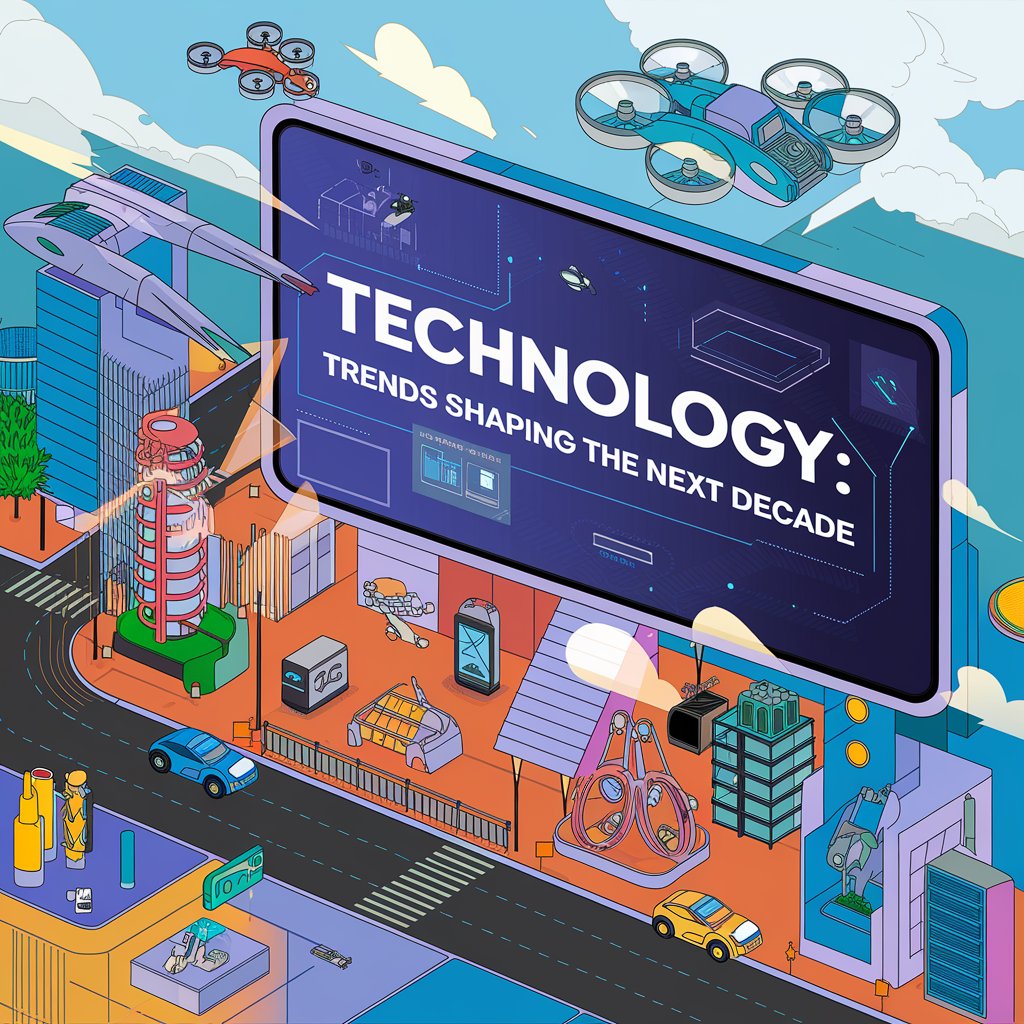Technology is evolving at an unprecedented pace, and today’s innovations are laying the foundation for a radically different future. From artificial intelligence (AI) to blockchain and the expansion of 5G networks, the next decade promises to change how we live, work, and interact with the world around us. As we stand on the brink of this technological revolution, it’s essential to understand the trends that are shaping the future of tech and how they might impact our daily lives.
1. Artificial Intelligence and Machine Learning
Artificial intelligence (AI) and machine learning (ML) are no longer just buzzwords—they are becoming integral to industries across the globe. From healthcare and finance to marketing and manufacturing, AI is transforming the way businesses operate and how people experience the world. In the next decade, AI is expected to become even more sophisticated, with advancements in natural language processing, deep learning, and computer vision.
AI-powered tools are already automating tasks that once required human intervention, but the future will see AI enhancing decision-making, improving customer experiences, and creating entirely new business models. For example, AI-driven algorithms are already used in self-driving cars, predictive maintenance in factories, and even personalized content recommendations on streaming platforms.
As AI continues to develop, ethical concerns around privacy, bias, and job displacement will need to be addressed. However, the potential for AI to improve efficiency, save costs, and drive innovation is vast.
2. 5G and the Internet of Things (IoT)
5G technology is set to revolutionize connectivity. Offering faster speeds, lower latency, and the ability to handle more devices simultaneously, 5G will be a game-changer for the Internet of Things (IoT), which refers to the network of physical devices, vehicles, home appliances, and more that are connected to the internet.
With 5G, IoT devices will become more reliable and responsive, enabling innovations like smart cities, connected healthcare, and autonomous transportation. For instance, in healthcare, IoT devices can remotely monitor patient vitals in real-time, sending alerts to doctors if immediate intervention is needed. In transportation, 5G-enabled self-driving cars will be able to communicate with each other to avoid accidents and optimize traffic flow.
As the global 5G rollout continues, industries will increasingly rely on ultra-fast, low-latency networks to power next-generation technologies.
3. Blockchain and Decentralized Finance (DeFi)
Blockchain technology, the backbone of cryptocurrencies like Bitcoin and Ethereum, has applications far beyond digital currencies. At its core, blockchain provides a secure, transparent, and decentralized way to store and transfer data, making it ideal for applications in sectors like finance, supply chain management, and healthcare.
One of the most exciting developments in the blockchain space is Decentralized Finance (DeFi), a movement that seeks to recreate traditional financial services (like lending, borrowing, and trading) without intermediaries such as banks. By using smart contracts, DeFi platforms allow users to engage in peer-to-peer transactions directly.
As blockchain technology matures, it will likely disrupt industries beyond finance. For example, it could be used to improve supply chain transparency, enhance data security in healthcare, or streamline intellectual property protection.
4. Augmented Reality (AR) and Virtual Reality (VR)
While augmented reality (AR) and virtual reality (VR) have already made their mark in gaming and entertainment, their applications are expanding into various other industries. In education, AR and VR are revolutionizing how students learn by providing immersive experiences that bring subjects like history, science, and art to life. For instance, VR can take students on virtual field trips to ancient Rome or the bottom of the ocean.
In retail, AR is enabling virtual try-ons, allowing customers to see how clothes, makeup, or furniture will look before making a purchase. In healthcare, VR is being used for surgical training and pain management. As hardware becomes more affordable and software more sophisticated, AR and VR are expected to see widespread adoption across various sectors in the coming years.
5. Quantum Computing
Quantum computing is still in its infancy, but it holds the potential to solve problems that would be impossible for traditional computers to tackle. By leveraging the principles of quantum mechanics, quantum computers can process enormous amounts of data at once, potentially revolutionizing fields like cryptography, drug discovery, and climate modeling.
For instance, quantum computing could dramatically speed up the process of simulating complex chemical reactions, opening up new possibilities in pharmaceuticals and materials science. However, we’re still a few years away from seeing practical, large-scale quantum computing applications. That said, tech giants like IBM, Google, and Microsoft are heavily invested in quantum research, and progress is being made every year.
6. Automation and Robotics
Automation and robotics are transforming industries like manufacturing, logistics, and healthcare. Robots and automated systems are taking over repetitive, dangerous, and time-consuming tasks, allowing humans to focus on more creative and strategic activities.
In warehouses, robots can move goods more efficiently than human workers, while in healthcare, robots are assisting in surgeries and performing delicate procedures with precision. Automation is also making its way into home environments, with devices like robotic vacuums and automated assistants helping manage daily tasks.
As robotics and automation continue to advance, there will be challenges around workforce displacement and reskilling. However, these technologies also have the potential to improve safety, reduce costs, and increase productivity across sectors.
7. Sustainability Tech
As concerns over climate change grow, technology is playing a crucial role in helping businesses and individuals reduce their environmental footprint. From renewable energy innovations to carbon capture technologies, sustainability tech is gaining significant traction.
Solar and wind power are becoming more efficient, while energy storage solutions like advanced batteries are helping make renewable energy more reliable. Electric vehicles (EVs) are becoming more mainstream, and startups are exploring ways to create sustainable, eco-friendly materials and products.
The next decade will likely see even more breakthrough innovations in clean energy, sustainable agriculture, and waste management, helping society transition to a more sustainable future.
8. Cybersecurity
As technology advances, so do the risks associated with cyberattacks. With the increasing amount of personal, financial, and corporate data being stored online, cybersecurity is more important than ever. The rise of AI and machine learning is being used to develop more sophisticated defense mechanisms, but cybercriminals are also using these same technologies to launch more complex attacks.
In the coming years, we will see an increased emphasis on cybersecurity measures, including biometric authentication, end-to-end encryption, and blockchain-based security systems. Governments, businesses, and individuals will need to stay vigilant to protect against emerging threats in an increasingly connected world.
Conclusion
The next decade promises to be a thrilling time for technology. With advancements in AI, 5G, blockchain, AR/VR, quantum computing, and sustainability, the way we live, work, and interact will change dramatically. While these technologies offer incredible potential, they also raise important ethical, social, and regulatory challenges that must be addressed.
As we look toward the future, the key to success will be in how we adapt to these changes, harness their potential, and navigate the challenges they present. The future of tech is bright, and the next wave of innovations will likely shape the world in ways we can’t yet fully imagine



